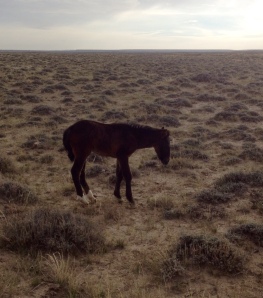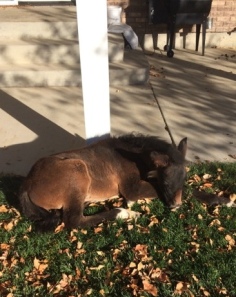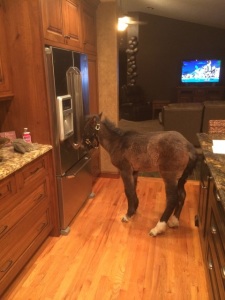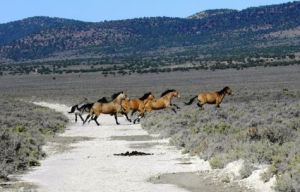Straight from the Horse's Heart
Farewell Wild Horses of Wyoming
Day 24
 I am getting ready to drive out to Bitter Creek Road so I can get led out to the observation site for the 24th and hopefully last day of the Checkerboard Roundup in Wyoming. The Cattoors and the BLM hope to capture more than 100 wild horses today from Salt Wells Creek.
I am getting ready to drive out to Bitter Creek Road so I can get led out to the observation site for the 24th and hopefully last day of the Checkerboard Roundup in Wyoming. The Cattoors and the BLM hope to capture more than 100 wild horses today from Salt Wells Creek.
We are here again in Adobe Town, on public land, 3 miles from the trap site which is out of sight behind a hill. There is a Ninth Circuit Court of Appeals case on the subject of BLM restrictions of public observations of roundups, which states:
“To provide this First Amendment protection, the Supreme Court has long recognized a qualified right of access for the press and public to observe government activities.”
Even though we ask for a better, closer spot to view the roundup, we are told that this is the location that the contractor has selected.
Shortly after we arrived at the observation site 3 miles from the trap Shelley Gregory the public information specialist spotted a group of 20 horses coming down the hill and a few minutes later we spotted the helicopter. Then we can see more and more groups of horses converging. They are so small this far away they look like ants and all we can distinguish is lighter colored horses from the darker probably grey or appy. We finally count about 50 horses streaming in lines and standing out against the huge cloud of dust. As they go into the trap the dust billows wildly. The two helicopters immediately head right back out. Suddenly a gorgeous grulla stallion runs right in front of us heading away from the trap. We hope he runs and never stops. Then about 30 more horses are brought in by both helicopters in another cloud of dust.
Linda and I are the only observers on Day 24. A white pickup comes roaring up the hill and a tall, big woman leaps out and starts yelling at Linda, and gets right in her face, looming over her. She said I demand that you give me your name and address and phone numbers, how dare you tell me where I can be on my private land, and you have to tell me who made the phone call to the Cattoors. She started insisting that someone from yesterday had called the Cattoors and said she was too close and told the Cattoors to make her move. In the meantime I was getting alarmed and frightened so I called to Shelley Gregory, the Public Information Specialist who accompanies up to the observation site and she rushed over and so did the BLM ranger. They got between her and us, thankfully, and I was never so grateful in my life to have the ranger there. Both Linda and I said we did not make any such phone call, but she did not believe either of us.
Then she started ranting about “you people” who have all this money and do this lawsuit, and she has lost all this money having to remove cattle from her land because of the horses, and that RSGA had to do something about these inbred horses, running all over her land, they are just feral ranch horses, no Spanish blood, worthless, and her family has been there for 100 years long before the horses were there, which really is not true of course. The horses have been here hundreds of years before her family began welfare ranching in this location.
The horses are most certainly not inbred in this herd, which used to be one of the largest remaining wild horses herds. The numbers exceeded the minimum number, 150 adults, of wild horses necessary to sustain genetic viability. And Gus Cothran, the leading geneticist on our wild horses has been genetically testing the Adobe Town and Salt Wells Creeks Herds for many years, and they have a high percentage of Spanish blood. she was ranting on and on I said you won, why are you yelling at us? They are taking all the horses. She said they can never get all the horses, they are still there. Luckily Shelley diffused the situation and took her aside and talked to her. The rancher asked where we were from and Linda said Colorado, asked for our names and towns and I said none of your business. Her mother, a small lady with white hair came out and told us that a stallion had taken the saddle pad right off of her daughter’s horse one time.
I said why don’t you just leave and she said this is public land you cannot make me leave and proceeded to stay up there for another hour and a half, probably just to annoy me. She had had a much better viewing spot than we did earlier before she came to harass us. She asked me what I was doing because I was typing on my phone as she was yelling at Linda, and asked if I were blogging about her and I said yes, and then she started ranting again about all the lies I was spreading about her. As she is muttering you better hope that your car doesn’t break down out here I know that I would rather walk the 20+ miles back to the highway than ask her for help.
Just before they left, she told me she wanted me to not post any pictures of her ranch on Facebook, would I not do that – I told her I don’t care about her ranch, I am here for the horses. She stomped off and drove away, and we were very relieved that she left.
I think it is a shame that she is the only representative of RSGA that anyone has been able to talk to. The four journalists who have been here during the roundup have all said that RSGA has been unwilling to give them an interview.
Helicopters brought in two more groups one of about 16 and another of 6 bringing the total for today to about 95. The helicopter was chasing a lone horse back and forth, back and forth, he stopped and went to meet another horse and possibly a foal. Then the helicopter peeled off possibly to refuel. We heard they are just going to possibly be bringing one more small group. We hope we are allowed to go see the horses in temporary holding once they are done.
I am now waiting to go into the temporary holding facility to see the over 100 horses that brought into the trap today from Salt Wells Creek near the Eversole Ranch. The last horse brought in today had the helicopter right over him for about an hour. He looked bewildered and slowed to a stop and a walk. We asked what they were doing and found out he was a young sorrel yearling and they were bringing a rider on horseback to catch him and put him in a trailer, which they finally did. The wrangler caught him and trotted and cantered with him to the trailer and he got in with the saddle horse and was taken to temporary holding.
As we were packing up to leave the observation point this morning after the helicopters finished for the day we were really surprised to hear and so were our BLM escorts to hear that this might NOT in fact be the last day of the roundup. Apparently there may be some more horses needing to be removed from the Checkerboard area even though the number removed is close to 1200 wild horses. We were told that because the number so far exceeded their estimates they were having a conference call with Washington D.C. this afternoon and that they might be rounding up more horses tomorrow. After what happened this morning with the woman from Eversole Ranch I think it is highly likely that she has been aggressively complaining that they did not catch every single horse on both her private and public leased land. This is speculation on my part, of course.
When we went into the temporary holding area in Salt Wells Creek this afternoon, we asked Sue Cattoor about what had actually happened with the rancher from Eversole and what had actually happened was she was parked too close to the path of the horses being driven on by the helicopters and Dave Cattoor called her and asked her to move. It had absolutely nothing to with us or any other member of the public observing the roundup at this trap site. The new location she moved to was still at least a mile closer than we were allowed to go.
At the temporary holding corrals late this afternoon I learned that they captured 129 horses today bringing the total to 1217 wild horses removed from their families and their homes. If they do capture 30-40 tomorrow on the really last day of the roundup they will have over 1250.
We did see the sorrel colt that had to be roped and put in the trailer – I had thought he was a yearling because he was so far away as it turns out he was a little foal too little to be weaned. He was happily reunited with his mother. There was a death today, in the morning, a weanling foal broke his neck when being sorted out for transport. The horses in the pens that we saw looked good and the big bay roan stallion was still king of the stallion corral.
Day 25
Linda and I left even though we knew they would be rounding up horses on this last day – neither of us wanted to go through another confrontation at the observation site with the angry rancher. Although the BLM ranger prevented us from being punched or even shot, he did not prevent the bullying and intimidation.
47 more wild horses are removed and the roundup is finally concluded. Of course the BLM has to have the last word, and posts on their Wyoming Facebook page that it is OUR fault that they removed 1263 instead of 800 wild horses in this roundup:
“Appeals and motions delayed removal operations, allowing more wild horses to move across the fluid boundary from solid block public lands into the checkerboard in preparation for winter and in search of water; thus, the population estimate for the checkerboard was surpassed by the number of wild horses actually removed.”
The truth is, we sought an emergency injunction to stop the roundup from occurring so that our case might be heard on its merits BEFORE the horses were rounded up and removed, because if we had won, none of these horses would have been removed. We lost the temporary injunction and the roundup went on. Our case has still not been heard, and the horses are being shipped or are already in Rock Springs and Canon City short term holding facilities.
I am sick, physically sick, and sick in heart and soul about what is happening to those horses right now. We will not hear about the rest of the deaths and injuries that will occur in transport and at the short term holding facilities. We will not hear about the final fate that can happen when the BLM sells the older horses under the Sale Authority Act, when they most likely will end up at slaughter. We may hear about the approximately 4% that get adopted.
To rub more salt in the wound, the BLM posted on Facebook these close up photos of these beautiful horses running into the trap, photos that they took close to the trap, an area none of the public were allowed to go into. The images I took that are in this post were taken at the public observation point with the longest lens available. The horses are simply dots.




















